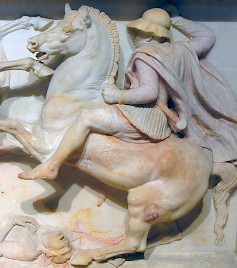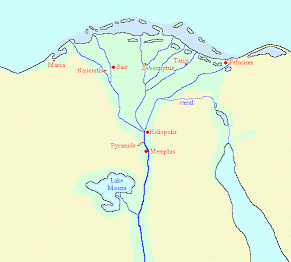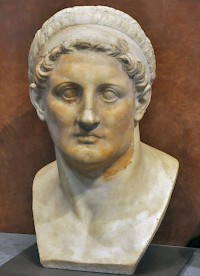Diadochi 2: The First Diadoch War
Diadochi ("successors"): name of the first generation of military and political leaders after the death of the Macedonian king and conqueror Alexander the Great in 323 BCE. To settle the question whether his empire should disintegrate or survive as a unity, and, if so, under whose rule, they fought several full-scale wars. The result, reached by 300, BCE, was a division into three large parts, which more or less coincided with Alexander's possessions in Europe, Asia, and Egypt.
During the next quarter of a century, it was decided whether these states could endure. As it turned out, there were no great territorial changes, although there were dynastic changes. After 280, the period of state-forming came to an end with three great states: Antigonid Macedonia, Ptolemaic Egypt, and the Seleucid kingdom in Asia.

While Peithon, Craterus and Antipater restored order in the east and west, Perdiccas himself was occupied in Cappadocia (central Turkey). Alexander had never conquered this country completely, and the last Persian satrap, a man named Ariarathes, had created a kingdom of his own. The Macedonian satrap of Phrygia, Antigonus Monophthalmus ('one eye'), had grown accustomed to defending the road between Macedonia and the east against Ariarathes' attacks. However, when Perdiccas successfully invaded Cappadocia, Antigonus did not appear. It is not known why. What is certain, however, is that when Perdiccas asked him to appear for a military court, he fled to Antipater's court in Macedonia.
During the last weeks of 321, civil war broke out between the Macedonians: Craterus and Antipater revolted. The conflict is called the First Diadoch War. Our sources focus on a dynastic conflict. Antipater's daughter Nicaea was promised to Perdiccas, but the regent broke off the engagement when Alexander's mother Olympias offered him Cleopatra, a full sister of the great king and the widow of king Alexander of Molossis. Antipater felt insulted, and this was, according to our sources, the reason for the civil war.
The truth may be a little bit different. If Perdiccas were to marry a daughter of Philip, their son would be the first in line for succession. After all, king Philip Arridaeus was an illegitimate son, and the baby Alexander was a half-breed. Of course, Antipater had good personal reasons to declare that he felt insulted, but the real reason for the civil war was only disguised by this argument. What made war inevitable was the growth of Perdiccas' power and the fear which this caused among the other Macedonian leaders - Antipater in the first place, but also Craterus and Antigonus.
And Ptolemy, the satrap of Egypt. He may have planned his independence for a long time, because he had chosen Egypt as his domain, a rich but inaccessible country that could easily be defended. Seeing that his three former fellow-officers were planning war, he deliberately provoked a conflict.
In December 321, Perdiccas sent the remains of Alexander to the tomb that had been prepared in Macedonia's religious capital, Aegae. When it had arrived in Damascus, Ptolemy convinced the leader of the convoy that Alexander had wanted to be buried in the temple of his heavenly father Zeus Ammon. Accordingly, the corpse was brought to Egypt, where it was to find a final resting place in Alexandria. This body-snatching was a provocation and Perdiccas was forced to organize a punitive action.
In 320, the four rebels cemented their alliance against Perdiccas by intermarriage. Antipater gave his daughters Phila and Eurydice to Craterus and Ptolemy; Nicaea, who had once been promised to Perdiccas, married to Lysimachus, the governor of Thrace. Perdiccas saw that a formidable coalition was being organized. He decided to invade Egypt, and sent Eumenes (Alexander's former secretary and now the satrap of Cappadocia) against the armies of Antipater and Craterus.
Eumenes had no experience as a military commander and had to face Craterus, the most experienced of all Macedonian generals. Nevertheless, he accepted battle (late April; probably somewhere near the Hellespont), and, to everybody's surprise, defeated his opponent. Craterus died fighting; what was left of his army managed to leave the battle field and joined Antipater.

It was May 320 when Perdiccas reached Egypt. Twice, he tried to cross the Nile near Pelusium, but Ptolemy was able to prevent this. Now, Perdiccas moved to the apex of the Delta, and retried the river crossing in the neighborhood of Heliopolis. However, his men were carried away by the Nile. To all those present, it was obvious that Perdiccas could never invade Egypt, and his soldiers - already resenting his strictness - revolted. Perdiccas sought the advice of his colonels Peithon, Antigenes, and Seleucus. They, however, decided to kill Perdiccas, to put an end to the civil war.
Ptolemy and Perdiccas' officers started negotiations. Ptolemy was offered the regency, but he was too smart to take the bait: he wanted to keep what he had won, not risking it in a larger game. He appointed Peithon and an officer named Arridaeus, two people who were clearly lacking prestige and would never be able to stop separatists like Ptolemy.

However, Antipater was not happy with this arrangement. He wanted to be the new regent, and he may have been capable of reuniting Alexander's empire. At Triparadisus (perhaps at Baalbek), he settled the affairs in the way he wanted. The most important points of the settlement were (text):
- Ptolemy was to remain satrap of Egypt;
- Perdiccas' murderer Seleucus was to become satrap of wealthy Babylonia;
- the second murderer and former regent, Peithon, was to remain responsible for Media;
- the third murderer, Antigenes, was the new satrap of Elam;
- the former regent Arridaeus was the new satrap of Hellespontine Phrygia;
- Antipater's ally, Lysimachus, kept Thrace;
- his ally Antigonus Monophtalmus was reappointed as satrap of Pamphylia, Lycia and Phrygia, to which Lycaonia was added;
- Antigonus was to take over Perdiccas' army and had to expel Eumenes;
- Antipater himself was the new regent and would keep an eye on queen-mother Roxane, Philip Arridaeus and the young Alexander IV, who were to move to Macedonia.
Having settled all affairs, Antipater and the royal family went to Macedonia. He died in the autumn of 319.
The settlement at Triparadisus meant the end of the united empire. The contours of the future became visible. The independence of Egypt was officially recognized, and Antipater and Antigonus, the commander of the largest armies, had in fact divided Europe and Asia between themselves.